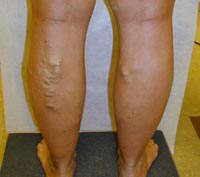Treat varicose veins naturally

Varicose veins can, at best, be unattractive and at worst be dangerous for your health. They most frequently affect the legs and for most people, they fall somewhere in between, causing pain and discomfort. So it’s good to know there are quite a few things you can do to reduce your risk of developing them or to minimise the symptoms.
Simply put, varicose veins are veins that have dilated as a result of lost elasticity combined with a weakening of the one-way valves in the veins. These valves are supposed to stop the blood from falling back in the direction of gravity and away from your heart but if they are weakened you can get a pooling of blood in the dilated veins, hence the bulges characteristic of varicose veins.
Veins are not especially robust. Being above your most healthy weight, standing for long periods of time, a low fibre diet, multiple pregnancies, family history and a loss of tissue and muscle tone associated with aging can all increase your risk of developing varicose veins.
Varicose veins can often be without symptoms with the main complaint being an unsightly appearance. However, some people will complain of swelling, aching, itching, heaviness in the limb and fatigue. In severe cases the circulation to the lower leg is affected and may result in leg ulcers, eczema and changes to the appearance of the skin. Most commonly, the veins closer to the surface are affected however if the deep veins are affected it can have serious implications for your general cardiovascular health. If you think your symptoms could be due to varicose veins, your doctor should be able to accurately diagnose this for you.
So, what can you do to help prevent the development of varicose veins?
1. Do your best to maintain a healthy weight
2. Eat a diet high in fibre to avoid constipation and straining. Simply put, that means lots of fruit, vegetables, legumes and wholegrains…think wholemeal bread, brown rice, wholemeal pasta, oats etc.
3. Don’t forget to drink plenty of water as well
4. If you find yourself having to stand for long periods of time, support stockings can be useful
5. Exercise and activities such as walking, running, dancing or riding a bike all help to promote circulation and prevent pooling of blood because they work on contraction of the leg muscles which squeezes the blood back into circulation.
In addition, you may benefit from boosting foods rich in vitamins C and E along with bioflavanoids and zinc. These nutrients are all important for healthy veins and connective tissue. You can get bioflavanoids from your diet especially, blueberries, cherries, blackberries. You’ll find good amounts of zinc in lean meat, chicken and seafood as well as pumpkin seeds and mushrooms. In addition, foods such as garlic, onion, ginger and cayenne are all good for your circulation. Pineapple contains bromelain which may be helpful in preventing the hard lumpy skin.
Depending on the severity of your problem, any other health issues and the quality of your diet, you may benefit from taking additional supplements of these key nutrients. Addressing any constipation issues is also important. Increased straining leads to increased abdominal pressure which can impede the blood flow from the legs to the heart and puts pressure on the veins.
 If you are interested in taking herbal supplements, look for herbs such as Aesculus hippocastanum (horse chestnut), Centella asiatica (gotu kola) and Ruscus aculeatus (butcher’s broom). It is always safest to have these (and any other supplements) prescribed for you by a qualified naturopath or herbalist to ensure they do not cause a problem with any other medication you might be taking. Generally, these will be taken internally but you might also benefit from topical creams.
If you are interested in taking herbal supplements, look for herbs such as Aesculus hippocastanum (horse chestnut), Centella asiatica (gotu kola) and Ruscus aculeatus (butcher’s broom). It is always safest to have these (and any other supplements) prescribed for you by a qualified naturopath or herbalist to ensure they do not cause a problem with any other medication you might be taking. Generally, these will be taken internally but you might also benefit from topical creams.
It should be noted that in some cases, surgery may be the most appropriate course of action and this should be discussed with your GP. However, for the majority, following the suggestions I discussed will help reduce your chances of developing varicose veins or may help you to live with them and still enjoy your best life.








 Proudly Australian owned and operated
Proudly Australian owned and operated